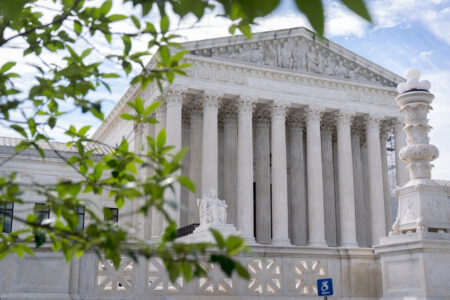Case blocking state funding for Catholic trade school moving forward

(Capitol Notes - Graphic Illustration/MetroCreative)
CHARLESTON – The civil case to block the spending of $5 million in West Virginia taxpayer funds for a private Ohio-based Catholic trade school to expand into the state can move forward. According to the West Virginia chapter of the American Civil Liberties Union (ACLU-WV) in a social media post Monday, Kanawha County Circuit Court Judge Richard Lindsay ruled against a motion to dismiss a lawsuit brought by the ACLU-WV on behalf of the American Humanist Association against the West Virginia Water Development Authority (WDA). “Our case challenging a $5 million grant in water development funds to a ‘radically Catholic’ school in Ohio can move forward,” the ACLU-WV said. “Thousands in West Virginia lack clean water. Forcing them to fund this school’s religious mission with money meant for infrastructure is wholly inappropriate.” The ACLU-WV filed suit against the WDA in January after the authority awarded $5 million from the Economic Enhancement Grant Fund (EEGF) last October to the College of St. Joseph the Worker, a Steubenville-based college affiliated with the Catholic Church. All students at the College of St. Joseph the Worker earn a Bachelor of Arts in Catholic Studies while also receiving training in several trades, including carpentry, HVAC, plumbing, and electrical. The College promotes graduating students with zero debt. According to the grant proposal, the College proposed using the $5 million award to create a construction and real estate company headquartered in Weirton for training apprentices, scholarships for the recruitment of West Virginia students and training facilities near Weirton, and creation of a branch campus in the Kanawha County/Putnam County area. The College had also proposed using $1 million of the EEGF award for advocacy, including $750,000 to create the “Center for the Common Good” to support “life-affirming policy in West Virginia.” This think tank would focus on conservative public policy. However, the grant agreement signed by the College with the WDA prevents the use of EEGF monies for anything other than workforce training. The ACLU-WV filed suit against the WDA and its director, Marie Prezioso, alleging that the awarding of the grant violated Article III Chapter 15 of the West Virginia Constitution’s Establishment Clause, which guarantees religious freedom, stating that “No man shall be compelled to frequent or support any religious worship, place or ministry whatsoever.” The ACLU-WV’s complaint argues that the state’s funding of an explicitly religious entity violates the separation of church and state enshrined in the West Virginia Constitution. In its motion to dismiss filed on April 25, attorneys for the WDA argued that the grant is constitutional because it serves a secular economic development purpose by training skilled tradespeople and that denying funds based on the college’s religious affiliation would infringe upon religious freedom. “The grant from that fund here supported the College’s objective to build a campus in West Virginia and train its students in one of five primary industries: HVAC, masonry, plumbing, electrical, or carpentry,” wrote Michael Williams, Solicitor General for the state Attorney General’s Office, which is representing Prezioso and the WDA. “The Authority saw an opportunity to support a program that would train tradesmen who would ultimately contribute to West Virginia’s economy and fill a need in West Virginia’s workforce, as the Legislature wanted,” Williams continued. “Although the school receiving the grant has a broader religious mission, that tie does not relegate it to second-class status. Indeed, denying the College funds because of its religious affiliation would itself create a problem under both the Establishment and Free Exercise Clauses of the federal Constitution.” Attorneys for the ACLU-WV filed a response to the motion to dismiss on May 16, urging Lindsay to not grant the motion. “Our state constitution, Article III, Section 15, bars the state from compelling individuals to ‘support any religious worship, place or ministry whatsoever’ or ‘pass any law requiring or authorizing any religious society, or the people of any district within this state, to levy on themselves, or others, any tax for the erection or repair of any house for public worship, or for the support of any church or ministry,'” wrote ACLU-WV attorney Aubrey Sparks. “Any facially neutral program – including the grant program at issue in this case – is limited by restriction.” On May 23, Williams also submitted a reply in support of the WDA’s motion to dismiss the case on behalf of Attorney General J.B. McCuskey in which they argue that the ACLU-WV’s client has no standing to bring the lawsuit and that the ACLU-WV did not provide the state a 30-day notice of its intent to file suit. “Plaintiff argues that a state entity violates Article III, Section 15 of the West Virginia Constitution whenever it sends money to an institution with religious ties,” Williams wrote. “But in pressing that argument, Plaintiff ignores just about all the relevant authority on that section in West Virginia, hints at exhuming a now-repudiated Establishment Clause test from the federal courts, rewrites early American history, and invites this Court to endorse a separate Free Exercise violation. Perhaps worse still, Plaintiff overlooks serious jurisdictional defects in its own complaint.” The ACLU-WV is seeking a declaration from the court that the WDA violated the state Constitution in awarding the grant and an injunction blocking the grant award.





